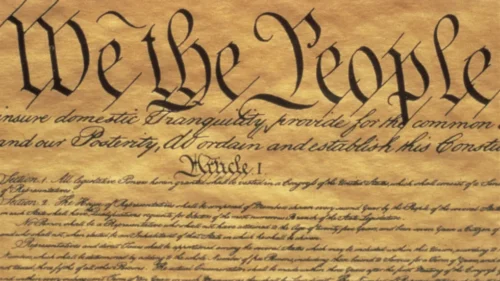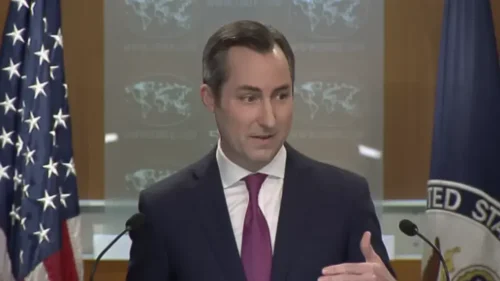English speakers have traditionally mocked the French institution known as the “Académie Française.” It was created four centuries ago to regulate the French language, providing authoritative definitions of every single word in the dictionary.
Every English speaker understands that languages are living tools not regulated by governments, but created by the mass of people who speak and write the language. Professional lexicographers define words at the behest of editors seeking to sell dictionaries on the free market. The job of a dictionary is to help citizens understand how other people use the words of the language. No honest person needs an agency appointed by the government to decide what words mean. As a warning of what might come if that principle was ever forgotten, George Orwell wrote a book in 1948 describing that ignominious process: 1984!
In the context of protests on United States college campuses against Israel’s war on Gaza, The Intercept’s Natasha Lennard reported information revealed by Haaretz, an Israeli newspaper, concerning Columbia University’s task force on antisemitism. Lennard informs readers “that a definition of antisemitism will be put forward — and it will include anti-Zionism.” More specifically, the task force’s brief “is expected to determine that statements calling for the destruction and death of Israel and Zionism can be considered antisemitic.”
“This definition is designed to inform faculty and students about what can offend Jewish people and which types of statements can cause pain and discomfort,” Haaretz stated.
This exceptional initiative to co-opt the task of professional lexicographers should impel us to think deeply not just about what the definition of “antisemitism” might be, but far more radically, about what the definition of “definition” should be.
Today’s Weekly Devil’s Dictionary definition:
Definition:
An always partial, limited, incomplete and sometimes distorted formulation found in dictionaries for the purpose of giving an idea of the sense or rather association of meaning that competent speakers of a language recognize as one of the designations that is frequently — though not necessarily — shared by other competent speakers of the language.
Contextual note
My proposed “definition” seeks to be precise by being vague, which is to say, as inclusive as possible in its account of the general public’s perception of the word. Formal dictionary definitions do not attempt to be inclusive. To be truly inclusive, every definition would require a lengthy essay.
Dictionary.com offers this definition of definition: “the formal statement of the meaning or significance of a word, phrase, idiom, etc., as found in dictionaries.” Note that the author of this definition felt obliged to include an essential allusion to context: “as found in dictionaries.” It’s a way of saying: “I’m only talking about that convention used in the kind of book we all identify as a dictionary.” The author acknowledges that in different contexts the same word will have a very different signification.
My “Shorter Oxford Dictionary” published in 1967 contains five different definitions of definition. The first entry dating from 1483 states: “The setting of bounds; limitation (rare).” It’s only the fourth entry that points us towards the practice of dictionaries, and it is divided into two meanings: “A precise statement of the essential nature of a thing” and “A declaration of the signification of a word or phrase.”
We should note this important point: A dictionary definition focuses on “the essential nature of a thing.” In the case of antisemitism, everyone spontaneously understands that what is essential is the reference to the Jewish religion or Jewish people. The attitude towards a particular national government or its policies at a moment in time is unequivocally non-essential.
Lennard acknowledges the task force’s action is limited to a specific context of use: the development of a “mandatory antisemitism orientation.” This specification of context is important, but rather than offering some useful precision about the meaning of words, the fact that it will be mandatory instruction makes the fait accompli of a definition artificially imposed even more troubling. A mandatory program that seeks to redefine a culturally loaded word with the objective of judging or constraining the freedom of thought and expression of others falls into the category of unmitigated authoritarianism. This is the contrary of the spirit of a liberal education.
The Intercept article explains that the pretext for this redefinition has nothing to do with homing in on the actual use of the word in authentic linguistic contexts. Rather, it has everything to do with anecdotal reports of the “discomfort” felt by certain individuals when exposed to other people’s speech. The whole point of branding those forms of speech “antisemitism” is to ostracize and therefore limit the way other people speak when unconstrained by official rules.
The ultimate absurdity is that to accomplish this goal of general censure requires a prestigious educational institution such as Columbia University to stretch the meaning of antisemitism to include a notion associated with a different word that remains undefined: anti-Zionism. The task force might have better spent its time defining anti-Zionism. But that would have required examining a century and a half of history, something the task force prefers to avoid. It runs the risk of getting people to think and express themselves freely.
Defenders of the task force’s imitative insist that they aren’t trying to modify the dictionary, but simply give some precision to the points made in the mandatory instruction. “Even if the only use of the definition is during mandatory orientations on antisemitism,” Lennard points out, “its deployment inscribes the dangerous antisemitism/anti-Zionism conflation into campus culture. Views of Palestinians, anti-Zionist Jews, and the many others in the community who express criticism of Israel are bound to be delegitimized.”
Historical note
The US has consistently celebrated its commitment to free speech. Just as consistently it has found ways, official and unofficial, to suppress it. A mere decade after ratifying the constitution’s Bill of Rights that enshrined the basic freedoms, Congress, fearing a war with France, passed the Alien and Sedition Acts. The second of these acts “banned the publishing of false or malicious writings against the government and the inciting of opposition to any act of Congress or the president.”
When the war with France failed to materialize, those acts were allowed to expire or were repealed. That was not the case with the much more drastic Espionage Act of 1917, passed during World War I. It is still in vigor to this day and has been used, with surreal effect, against government whistleblowers Edward Snowden, Julian Assange and others. Despite the obvious contradiction with the letter and spirit of the First Amendment, Americans easily tolerate acts that restrict speech whenever they are convinced there is a threat from a foreign enemy. Consequently, politicians set about trying to convince citizens there is a threat, even if none exists.
What made some kind of sense in World War I is difficult to understand today. The idea that the US should bend its commitment to its own basic rights in the interest of Israel, a foreign power credibly accused of genocide, stretches beyond any patriotic reasoning the logic of “national security.” But contemporary US presidents and Congress demonstrate an incorrigible knack for prioritizing the interests of an extremist government in Israel over enforcing the basic freedoms enshrined in the constitution for its own citizens. Congress is nearly unanimous in its weaponizing of the notion of antisemitism.
Linguistic manipulation is common in times of war. In 1917, sauerkraut was rechristened “liberty cabbage.” Even the quintessential US dish, the hamburger, became a “liberty steak.” Orchestras refused to perform Beethoven. In 2003, George W Bush renamed French fries “freedom fries” to spite the French who had the audacity to disbelieve the manufactured lie that Saddam Hussein was threatening the Western world with weapons of mass destruction. The tradition of redefining or even renaming words to please political interests long ago earned its title of nobility in US culture.
The real lesson we should draw from the “liberty cabbage” episode is that people in times of war twist language as a way of affirming their authority and stirring hatred against critics. When protesters today say “Free Palestine from the river to the sea” they are not attacking Jews, they are expressing their frustration with the historic policies of successive Israeli governments. They are protesting very visible war crimes being carried out before their very eyes.
Anti-Zionism is simply NOT antisemitism!
*[In the age of Oscar Wilde and Mark Twain, another American wit, the journalist Ambrose Bierce produced a series of satirical definitions of commonly used terms, throwing light on their hidden meanings in real discourse. Bierce eventually collected and published them as a book, The Devil’s Dictionary, in 1911. We have shamelessly appropriated his title in the interest of continuing his wholesome pedagogical effort to enlighten generations of readers of the news. Read more of Fair Observer Devil’s Dictionary.]
The views expressed in this article are the author’s own and do not necessarily reflect Fair Observer’s editorial policy.
[Lee Thompson-Kolar edited this piece.]
The views expressed in this article are the author’s own and do not necessarily reflect Fair Observer’s editorial policy.
Support Fair Observer
We rely on your support for our independence, diversity and quality.
For more than 10 years, Fair Observer has been free, fair and independent. No billionaire owns us, no advertisers control us. We are a reader-supported nonprofit. Unlike many other publications, we keep our content free for readers regardless of where they live or whether they can afford to pay. We have no paywalls and no ads.
In the post-truth era of fake news, echo chambers and filter bubbles, we publish a plurality of perspectives from around the world. Anyone can publish with us, but everyone goes through a rigorous editorial process. So, you get fact-checked, well-reasoned content instead of noise.
We publish 3,000+ voices from 90+ countries. We also conduct education and training programs
on subjects ranging from digital media and journalism to writing and critical thinking. This
doesn’t come cheap. Servers, editors, trainers and web developers cost
money.
Please consider supporting us on a regular basis as a recurring donor or a
sustaining member.
Will you support FO’s journalism?
We rely on your support for our independence, diversity and quality.











Comment